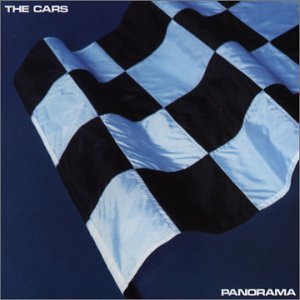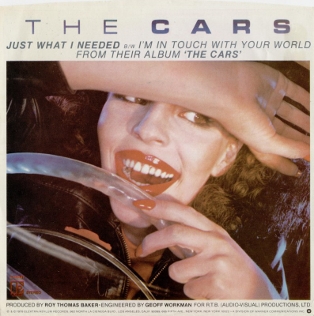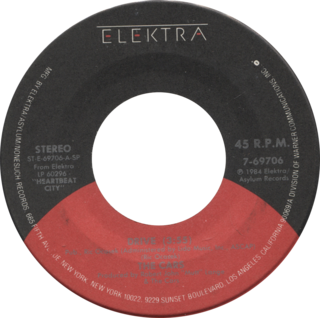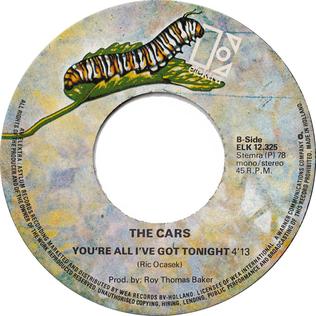Related Research Articles

The Cars were an American rock band formed in Boston in 1976. Emerging from the new wave scene in the late 1970s, they consisted of Ric Ocasek, Benjamin Orr, Elliot Easton, Greg Hawkes (keyboards), and David Robinson (drums). Ocasek and Orr shared lead vocals, and Ocasek was the band's principal songwriter and leader.

Candy-O is the second studio album by American new wave band the Cars, released on June 2, 1979, by Elektra Records.

Benjamin Orr was an American musician. He was best known as the bassist, co-lead vocalist, and co-founder of the band the Cars. He sang lead vocals on several of their hits, including "Just What I Needed", "Let's Go", "Moving in Stereo", and "Drive". He also had a moderate solo hit with "Stay the Night".

Panorama is the third studio album by American new wave band the Cars, released on August 15, 1980, by Elektra Records. Like its predecessors, it was produced by Roy Thomas Baker and released on Elektra Records.

"Just What I Needed" is a song by American rock band the Cars from their self-titled debut album (1978). The song, which first achieved radio success as a demo, took inspiration from the Ohio Express and the Velvet Underground. The song is sung by bass player Benjamin Orr and was written by Ric Ocasek.

"Drive" is a song by American rock band the Cars from their fifth studio album, Heartbeat City (1984). It was released on July 23, 1984, as the album's third single. Written by Ric Ocasek, the track was sung by bassist Benjamin Orr and produced by Robert John "Mutt" Lange with the band. Upon its release, "Drive" became the Cars' highest-charting single in most territories. In the United States, it peaked at number three on the Billboard Hot 100 and topped the Adult Contemporary chart. It reached number five in the United Kingdom, number four in West Germany, number six in Canada and number three in Ireland.
"Moving in Stereo" is a song by the American rock band The Cars. It appeared on their first album, The Cars, released in 1978. It was co-written by Ric Ocasek and the band's keyboard player Greg Hawkes, and sung by bassist Benjamin Orr.

The New Cars were a band formed in 2005 by two of the original members of the 1970s/1980s new wave band the Cars. The band was composed of original Cars members Elliot Easton and Greg Hawkes, along with vocalist/guitarist Todd Rundgren, bassist/vocalist Kasim Sulton, and drummer Prairie Prince. The band performed the Cars' songs, some new material, and selections from Rundgren's career.

This Side of Paradise is the second solo studio album released by Ric Ocasek, lead singer and songwriter of the Cars. It was released in 1986 by Geffen Records. Though it was a solo album, other members of the Cars played significant roles. Greg Hawkes plays keyboards and bass throughout the album, and also co-wrote "Hello Darkness". Benjamin Orr is on backing vocals for three songs. Along with Hawkes and Orr, the track "True to You" also features Elliot Easton on guitar. Both production and drumming were by Chris Hughes. Hughes had been the recent producer of Tears for Fears most popular two albums. Steve Stevens from Billy Idol's band plays guitar on over half of the album.

"Good Times Roll" is a song by American rock band the Cars released as the first track from their 1978 debut album The Cars. Written by Ric Ocasek as a sarcastic comment on rock's idea of good times, the song features layered harmonies courtesy of producer Roy Thomas Baker.

"All Mixed Up" is a song by the Cars and the final track on their 1978 self-titled debut album. It was written by bandleader Ric Ocasek.
"Bye Bye Love" is a song by the American Boston-based rock band The Cars. The song appears on the band's 1978 debut album The Cars. It was written by bandleader Ric Ocasek and sung by bassist Benjamin Orr. The song was featured in the 2011 science-fiction film Super 8.
"Dangerous Type" is a 1979 song by the Cars from their second studio album, Candy-O. It was written by Ric Ocasek.

"You're All I've Got Tonight" is a song by the American rock band the Cars, from their debut album, The Cars. Like "Bye Bye Love" and "Moving in Stereo", two other songs from the album, it continues to receive airplay on classic rock stations today despite never having been released as a single.

"My Best Friend's Girl" is a song by American rock band the Cars from their 1978 self-titled debut album on Elektra Records, released on June 6 of that year. Written by Ocasek as a song about something that "probably ... happened to a lot of people," the track found radio success as a demo in 1977.

"It's All I Can Do" is a song by the American rock band the Cars. It is the third track from their 1979 album Candy-O. It was written by the band's leader and songwriter Ric Ocasek, and features bassist Benjamin Orr on vocals.

"I'm Not the One" is a song by the American rock band the Cars, from their fourth album, Shake It Up. It features Ric Ocasek on lead vocals, Benjamin Orr singing the 'you know why' phrase, and the whole group repeating "going round and round" as backing vocals throughout the song.

"Since You're Gone" is a song by the American rock band the Cars. It was released as the second single from their fourth album, Shake It Up.
"I'm in Touch with Your World" is a song by the American rock band The Cars, from their debut album, The Cars. It was written by Ric Ocasek.

"Don't Tell Me No" is a song by the American New wave band, the Cars. The song, written by Ric Ocasek, appeared on the band's third studio album, Panorama.
References
- 1 2 3 4 Maginnis, Tom. "The Cars: Candy-O song review". AllMusic . Retrieved October 26, 2010.
- ↑ "The Cars interview". YouTube . Archived from the original on 2021-12-21.
- ↑ Frozen Fire: The Story of The Cars, by Toby Goldstein and Ebet Roberts, Contemporary Books, Inc. Chicago. ISBN 0-8092-5257-0
- ↑ "Candy-O The Cars 1979". Rolling Stone . Archived from the original on June 21, 2012. Retrieved February 24, 2013.
- 1 2 Swanson, Dave (8 September 2015). "Top 10 Benjamin Orr Cars Songs". Ultimate Classic Rock. Retrieved 19 September 2019.
- ↑ Carson, Tom (1979-08-23). "The Cars: Candy-O". Rolling Stone . Archived from the original on 2007-11-24. Retrieved 2020-11-04.
- ↑ Kachejian, Brian (February 2024). "Top 10 Cars Songs". Classic Rock History. Retrieved 2024-09-16.
- ↑ Scavieli, Tony (12 May 2018). "11 Essential Songs from the Cars". Classic Rock History. Retrieved 2023-01-23.
- ↑ Dolan, Jon; Doyle,Patrick; Hiatt,Brian; Hoard, Christian; Leight, Elias; Sheffield, Rob; Shteamer, Hank (September 15, 2019). "The Cars' Ric Ocasek: 17 Essential Songs". Rolling Stone. Retrieved 2024-09-21.
- ↑ Raggett, Ned. "Melvins: Ozma review". allmusic . Retrieved October 26, 2010.
- ↑ Erlewine, Stephen Thomas. "The New Cars: It's Alive!". allmusic . Retrieved October 26, 2010.